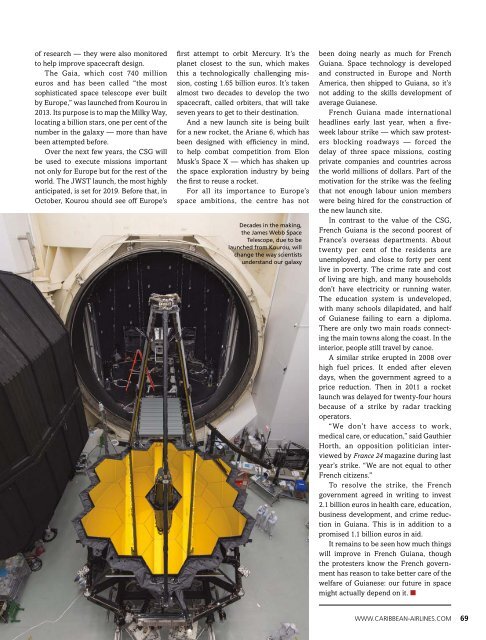You also want an ePaper? Increase the reach of your titles
YUMPU automatically turns print PDFs into web optimized ePapers that Google loves.
of research <strong>—</strong> they were also monitored<br />
to help improve spacecraft design.<br />
The Gaia, which cost 740 million<br />
euros and has been called “the most<br />
sophisticated space telescope ever built<br />
by Europe,” was launched from Kourou in<br />
2013. Its purpose is to map the Milky Way,<br />
locating a billion stars, one per cent of the<br />
number in the galaxy <strong>—</strong> more than have<br />
been attempted before.<br />
Over the next few years, the CSG will<br />
be used to execute missions important<br />
not only for Europe but for the rest of the<br />
world. The JWST launch, the most highly<br />
anticipated, is set for 2019. Before that, in<br />
October, Kourou should see off Europe’s<br />
first attempt to orbit Mercury. It’s the<br />
planet closest to the sun, which makes<br />
this a technologically challenging mission,<br />
costing 1.65 billion euros. It’s taken<br />
almost two decades to develop the two<br />
spacecraft, called orbiters, that will take<br />
seven years to get to their destination.<br />
And a new launch site is being built<br />
for a new rocket, the Ariane 6, which has<br />
been designed with efficiency in mind,<br />
to help combat competition from Elon<br />
Musk’s Space X <strong>—</strong> which has shaken up<br />
the space exploration industry by being<br />
the first to reuse a rocket.<br />
For all its importance to Europe’s<br />
space ambitions, the centre has not<br />
Decades in the making,<br />
the James Webb Space<br />
Telescope, due to be<br />
launched from Kourou, will<br />
change the way scientists<br />
understand our galaxy<br />
been doing nearly as much for French<br />
Guiana. Space technology is developed<br />
and constructed in Europe and North<br />
America, then shipped to Guiana, so it’s<br />
not adding to the skills development of<br />
average Guianese.<br />
French Guiana made international<br />
headlines early last year, when a fiveweek<br />
labour strike <strong>—</strong> which saw protesters<br />
blocking roadways <strong>—</strong> forced the<br />
delay of three space missions, costing<br />
private companies and countries across<br />
the world millions of dollars. Part of the<br />
motivation for the strike was the feeling<br />
that not enough labour union members<br />
were being hired for the construction of<br />
the new launch site.<br />
In contrast to the value of the CSG,<br />
French Guiana is the second poorest of<br />
France’s overseas departments. About<br />
twenty per cent of the residents are<br />
unemployed, and close to forty per cent<br />
live in poverty. The crime rate and cost<br />
of living are high, and many households<br />
don’t have electricity or running water.<br />
The education system is undeveloped,<br />
with many schools dilapidated, and half<br />
of Guianese failing to earn a diploma.<br />
There are only two main roads connecting<br />
the main towns along the coast. In the<br />
interior, people still travel by canoe.<br />
A similar strike erupted in 2008 over<br />
high fuel prices. It ended after eleven<br />
days, when the government agreed to a<br />
price reduction. Then in 2011 a rocket<br />
launch was delayed for twenty-four hours<br />
because of a strike by radar tracking<br />
operators.<br />
“We don’t have access to work,<br />
medical care, or education,” said Gauthier<br />
Horth, an opposition politician interviewed<br />
by France 24 magazine during last<br />
year’s strike. “We are not equal to other<br />
French citizens.”<br />
To resolve the strike, the French<br />
government agreed in writing to invest<br />
2.1 billion euros in health care, education,<br />
business development, and crime reduction<br />
in Guiana. This is in addition to a<br />
promised 1.1 billion euros in aid.<br />
It remains to be seen how much things<br />
will improve in French Guiana, though<br />
the protesters know the French government<br />
has reason to take better care of the<br />
welfare of Guianese: our future in space<br />
might actually depend on it. n<br />
WWW.CARIBBEAN-AIRLINES.COM 69


















